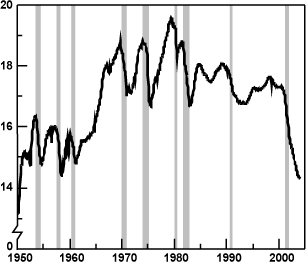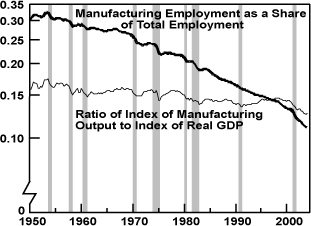Alternative Insight
The Socialization of America
The Bush administration is lost in rhetoric and does not realize that the nation is declining - economically, socially, politically and in its environmental obligations. A waged war and escalated oil prices remind present times of the early 1970's, an era that set conditions for a later stagflation. Government and business re-invented themselves to form National Competitiveness, a combination of increased productivity and technological advances, and solved the stagflation problem. A revival of National Competitiveness might not be applicable to the unfolding situation. Elevated productivity gains are no longer feasible and the mixed economies of the fast growing nations of China, India and Russia have advantages that are not easily overcome. The mixed economy allows controls of currency exchange rates, wages, prices, production facilities, health care expenditures and pension plans, which enable a quicker response to challenges and yield a competitive edge in the global economy. Changes in life style and a return to the social awareness that characterized the Roosevelt era might be more applicable solutions for assuring a prosperous America.The economics tell the better part of the story.
Economic Decline
Several major economic trends don't favor the U.S. economy.American trade balance has record deficits that increase U.S. liability to the world.
Source: U.S. Census Bureau, Foreign Trade Division.
YEAR EXPORTS
$trillionsIMPORTS
$trillionsDEFICIT
$billions2000 1.070 1.449 379 2001 1.006 1.369 363 2002 0.975 1.397 422 2003 1.020 1.517 497 2004 1.147 1.764 617 The dollar fall compared to the Euro has not decreased the trade gap.
On March 1, 2001, the dollar had a worth of 1.076 Euros.
On March 1, 2005, the dollar had a worth of 0.758 Euros.
Economic analysts expected the 30% decline in the dollar would greatly increase exports and decrease the trade gap. Exports have only increased by 14%, a small amount for a time when world trade is rapidly expanding. The trade gap has widened rather than lessened. What could be the reasons for these contrary phenomena?
- The United States is exporting goods and services that are not competitive and mildly depend upon pricing.
- The United States is importing goods that it can no longer manufacture and is captive to those markets regardless of their prices.
- The United States is refusing to lower its energy usage and is depending on foreign sources at the time that global demand is high and has raised its costs for oil and gas to record levels.
- The United States is deficient in entering the Chinese markets while becoming dependent on imports from China. The U.S. trade gap with China has risen from $101 billion in year 2000 to $162 billion in 2004. Most other industrialized countries have trade surpluses with China.
The dollar is artificially supported and could drop precipitously
The dollar has declined but still might be overvalued:
- Re-cycling of dollars from America's negative balance of payments to U.S. securities maintains the dollar's value.
- OPEC's pricing of petroleum in dollars increases demand for dollars.
- The dollar is still the currency for world trade and the world demands dollars.
- China's attachment of its Yuan to the dollar also maintains the dollar's value.
If the following occur, each of which is highly possible, the dollar's value could collapse and cause other economic problems:
- If China upward values the Yuan, prices of Chinese imports will greatly increase.
- If nations convert their dollar assets into other investments, or discontinue recycling their surplus dollars, US property and stock markets would decline. South Korea and Japan have hinted at investing in other assets.
- If OPEC barters petroleum for Euros, dollars will become less valuable. Saddam Hussein's Iraq had taken that step; one reason Iraq might have been attacked. Iran's government has intimated it will request Euros for oil sales. Venezuela's President Hugo Chavez seems intent on deserting the dollar and has made deals with 12 Latin American countries and Cuba for trading its oil.
Manufacturing production and employment have greatly decreased
Manufacturing, which is the essential industry for an industrialized capitalist economy, has been stagnant for several years. The Bureau of Labor Statistics estimated American manufacturing capacity at only 78.5% in Jan 2005.
The table below shows Manufacturing income.
Source: Department of Commerce, National Economic accounts
YEAR 2000 2001 2002 2003 2004 MANUFACTURING
trillions of dollars1.228 1.094 1.075 1.113 1.196 Production has remained stagnant but manufacturing employment has greatly decreased.
The left graph below describes the abrupt decrease in manufacturing employment to 1950 levels since the start of the North Atlantic Free Trade Agreement (NAFTA).
The right graph below shows a monotonic decrease in the significance of manufacturing jobs, which is due to several factors; increased productivity, decline of unions, outsourcing, foreign competition and transition to a service economy.
Source: Bureau of Labor statistics
Outsourcing is accelerating
The exact economic impact of outsourcing and the numbers of U.S. jobs it has transferred to foreign countries have been difficult to quantify. Outsourcing proponents claim benefits in competitiveness and ultimate financial gain to the American system. Outsourcing opponents counter with the argument that increased competitiveness assists selected businesses and not the nation. Outsourcing clearly results in losses of jobs, internal purchasing power and tax revenue. Some statistics:
- An MIT Report claims "outsourcing" activity rose from 12.4% to 22.1% between 1987 and 2002:
- BBC News, May 17, 2004, predicts that "by 2015 a total of 3.4 million previously US-based positions will have been relocated overseas."
Social Decline
The U.S. has social problems that are growing rather than diminishing. The administration expects that private initiatives will resolve the problems.(1) Relations with the world community - American philosophy of "preventive war" and military excursions have alienated many nations from the United States. Trade agreements in the European Union and South East Asian countries (directed by China) are depriving America of markets. Iran, Sudan, Angola and Venezuela are inviting investments that exclude the United States and which will eventually deprive America of valuable resources.
In Latin America, America's principal sphere of influence, several countries (Brazil, Chile, Venezuela and Uruguay) are considered mildly socialist and prepared to discard American influence. Meanwhile, China is investing heavily in Latin America.China's President Hu Jintao visited Argentina, Brazil and Chile in November—and promised to lay out tens of billions of dollars on improving the region's infrastructure. He also vowed that China's imports from Latin America—already showing an impressive rise —would grow even faster; and he added Argentina and Brazil to China's list of approved tourist destinations.
Dec 29th 2004 | BUENOS AIRES, From The Economist print edition(2) Social Security - While analysts predict a bankrupt social security system in mid-century, no adequate solution, except a private rescue plan, is being offered.
(3) Health care - Health care costs grew by 14 percent in 2003 and are expected to continue growing. Medicare costs are escalating and agency officials have stated they plans to charge seniors 15 percent more for premiums next year and pay doctors about 4 percent less for service. In the private sector, manufacturers are shifting the health care and retiree benefits to their employees.
(4) Pension Plans - According to the Pension Benefit Guaranty Corp (PBGC), the percentage of workers who have pensions that guarantee a specific monthly income has decreased from 78% in 1980 to 50% in 2005. The PBGC, which insures pension funds and assumes pension obligations from failed pension plans and bankrupt corporations, claims there are 31,000 pension plans run by American businesses and these plans have an estimated collective shortfall of $450 billion, a record figure.
Political Decline
The political trend finds a common ground at what is considered the center of the political spectrum. The two major parties recite differences but due to their commitment to the public center have similar programs. Bold social initiatives have become relics of the past. The status quo is maintained and domestic policies are left to the private sector.Environmental Decline
The United States has refused to join the Kyoto Protocol that limits emissions of greenhouse gases and combats global warming. Why? Secretary of State Condoleeza Rice says that joining the Kyoto Protocol would hurt the U.S. economy - which means lowering corporate profits. Global warming could greatly harm the American people, as well as the rest of the world, but that doesn't seem to matter.The Socialization of America
The rapid growth of the mixed economies of China, India and Russia demonstrate that a measure of control over currency exchange rates, wages, prices, production facilities, health care expenditures and pension plans give a nation a competitive edge in the global economy. These nations have a long way to go before their productivity peaks. Meanwhile, they can maintain wages low, increase them only as productivity increases and therefore maintain prices at a steady level.America will not adopt the political and economic features of the mixed economies. However, the huge trade deficit, government deficits, decline in manufacturing, shifts to outsourcing to become competitive and loss of value of the dollar show that private industry cannot counter the aggressive competition of the partially socialized nations. The United States has no choice but to become more social and align government and industry in common goals that will correct the deleterious trends.
- Cooperation between government and industry rather than free-wheeling economics will enable more rational decisions and predictable operations.
- Changes in life style that conserve energy (smaller cars, smaller houses) will lower energy prices, assist in the balance of payments and direct spending to domestic products.
- Distribution of wealth will increase spending on vital goods and reduce spending of superfluous goods. It will also bring citizens closer together, increase faith in the system and ameliorate social problems; eg.: crime, poverty, drugs.
- Ending of military adventures will reduce military spending, reduce the deficit and allow re-direction of wasteful military programs to more beneficial social programs.
- A National Pension plan, properly prepared of course, will resolve the Social Security and pension crises.
- A National Health plan, properly prepared of course and similar to those in other western nations, will resolve the Health crisis.
- Agreements on "outsourcing" will limit job losses.
- Participation in the Kyoto Protocol will enable a more serious challenge to the global warming threat.
- Government assistance will revive manufacturing.
- Improved regulation of immigration will preserve jobs for American citizens and prevent competition for wages.
The world firmly rejected the extreme socialist economies that limited prosperity. However, emerging nations have not embraced the free-wheeling capitalist adventures identified with the current American administration - and for good reason - concentration of wealth, misuse of limited resources, and intense competition for markets that can lead to war, are the eventual results of a world system that totally embraces rugged individualism. The global economy has been pioneered by the United States but has not been a perfect fit for the pioneering nation. In order to provide prosperity for its people, the United States must implement policies that offset the deleterious effects of globalism. American history shows that private industry has never been the sole source of solutions to recurrent economic problems. Only changes in life style and a return to the social awareness that characterized the Roosevelt era can solve the economic, social, political and environmental declines predicted for America's future.
alternativeinsight
april 1, 2005HOME PAGE MAIN PAGE 
alternativeinsight@earthlink.net
No Need to Login to post a comment.
comments powered by Disqus

